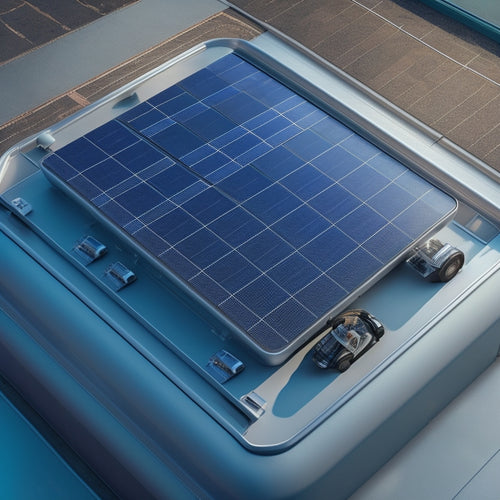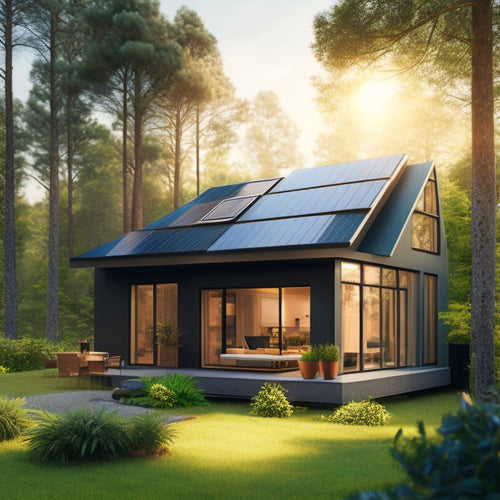
7 Surprising Benefits of Residential Solar Panels
Share
You're considering residential solar panels and wondering what benefits they bring. Well, you're in for a surprise! Not only do they increase your property value by up to 17%, but they also reduce your carbon footprint, slashing your energy bills in the process. Plus, government incentives and rebates can cover up to 30% of the total cost. What's more, solar panels provide energy independence, are durable and low maintenance, and even boost your home's curb appeal. And that's not all - you'll discover even more advantages as you explore the world of residential solar panels.
Key Takeaways
• Residential solar panels increase property value by up to 17% and provide a competitive edge in the market.
• Solar panels reduce energy expenses and provide a fixed rate plan, shielding homeowners from rising electricity rates.
• Generating clean energy with solar panels reduces reliance on the grid and provides control over electricity costs.
• Solar panels are built to withstand harsh weather conditions, guaranteeing efficiency and effectiveness for 25+ years with low maintenance requirements.
• Government incentives and rebates, such as the Solar Investment Tax Credit, reduce the cost of going solar, making it more accessible.
Increased Property Value Guarantee
Installing residential solar panels can substantially boost your property's value, with studies showing that for every dollar saved on energy costs, your property's value increases by approximately $15 to $20.
This significant boost in value is a vital consideration in the appraisal process, as it directly affects the real estate market trends.
In fact, solar panels have become a sought-after feature in today's market, influencing neighborhood dynamics and buyer psychology.
As a seller, you'll reap the benefits of increased property value, giving you a competitive edge in the market.
When it comes to selling your property, solar panels can be a major selling point, appealing to environmentally conscious buyers and those seeking to reduce their energy costs.
In a crowded market, solar panels can be the deciding factor for buyers, setting your property apart from others.
Additionally, solar panels can also increase your property's appeal to a wider range of buyers, expanding your pool of potential buyers.
Reduced Carbon Footprint Impact
As you shift to residential solar panels, you'll substantially reduce your carbon footprint, contributing to a cleaner environment.
By harnessing renewable energy, you'll minimize air and water pollution, slowing climate change and preserving natural resources for future generations.
With solar power, you'll play a crucial role in mitigating the adverse effects of fossil fuels on the environment.
Cleaner Air and Water
Cleaner Air and Water
By integrating residential solar panels into your home's energy system, you'll substantially reduce your reliance on fossil fuels, thereby decreasing air pollution and conserving water resources. This shift away from fossil fuels has a profound impact on the environment, particularly when it comes to aquatic life and ecosystems.
| Pollutant | Annual Reduction | Environmental Impact |
|---|---|---|
| Carbon Monoxide | 3,000 lbs | Reduces air pollution, protecting human health |
| Sulfur Dioxide | 500 lbs | Preserves aquatic life, reducing acid rain |
| Nitrogen Oxides | 1,200 lbs | Mitigates eutrophication, safeguarding ecosystems |
| Particulate Matter | 1,000 lbs | Improves air quality, reducing respiratory issues |
Slowing Climate Change
By harnessing the power of residential solar panels, you're set to reduce your carbon footprint, slashing emissions and playing a significant role in slowing climate change.
As a homeowner, you're taking a pivotal step towards mitigating the devastating impact of climate change. By switching to solar energy, you're reducing your reliance on fossil fuels, a major contributor to greenhouse gas emissions.
This, in turn, helps to decrease the amount of carbon dioxide released into the atmosphere, slowing the pace of global warming.
Your commitment to climate action is essential in paving the way for a sustainable future.
With residential solar panels, you're not only reducing your carbon footprint but also setting an example for your community. By embracing renewable energy, you're contributing to a collective effort to combat climate change.
Preserving Natural Resources
Your residential solar panels help preserve natural resources by reducing the demand on finite fossil fuels, thereby conserving these valuable assets for future generations.
By harnessing renewable energy from the sun, you're decreasing your reliance on non-renewable energy sources, which are rapidly depleting. This reduction in fossil fuel consumption leads to a significant decrease in greenhouse gas emissions, mitigating the strain on the environment.
As you shift to sustainable living, you're contributing to conservation efforts that protect the planet's natural resources.
By choosing residential solar panels, you're actively participating in the global movement towards a cleaner, greener future. This conscious decision not only benefits the environment but also sets a positive precedent for future generations.
Your commitment to sustainable living is essential in the fight against climate change.
Lower Electricity Bills Guaranteed
With residential solar panels, you'll enjoy significant savings on your energy expenses.
Your lower monthly costs will translate to more money in your pocket, and you'll have the added security of a fixed rate plan, shielding you from rising electricity rates.
Reduced Energy Expenses
You'll immediately notice a significant drop in your electricity bills once you've installed residential solar panels, as they harness free energy from the sun to power your home.
With solar panels, you'll be generating your own clean energy, reducing your reliance on the grid, and subsequently, your energy expenses.
This reduction in energy expenses isn't just a minor adjustment, but a substantial decrease that can be tracked and analyzed through bill analysis.
By monitoring your energy usage and production, you can refine your energy budgeting, making informed decisions about your energy consumption.
With solar panels, you're not only reducing your carbon footprint but also gaining control over your energy expenses.
You'll be able to identify areas of inefficiency and optimize your energy usage, further reducing your energy costs.
Lower Monthly Costs
By installing residential solar panels, homeowners can lock in lower monthly electricity costs, guaranteeing significant savings on their utility bills. You'll enjoy a budget-friendly solution that puts you in control of your energy expenses. With solar power, you can reduce your reliance on the grid, cutting your bills and expenses.
| Monthly Electricity Costs | With Solar Panels |
|---|---|
| Average Monthly Bill | $150 |
| Solar Panel Savings | -$75 |
| New Monthly Bill | $75 |
| Annual Savings | $900 |
| 10-Year Savings | $9,000 |
Fixed Rate Plans
Your fixed rate plan guarantees a lower electricity bill, as the cost of solar energy remains constant, shielding you from rising utility rates and price hikes.
With a fixed rate plan, you'll enjoy predictable and stable energy costs, allowing you to budget with confidence.
The contract terms are clear and transparent, ensuring you're protected from unexpected rate increases.
The plan's flexibility is another significant advantage.
You can choose a rate lock that suits your energy needs, ensuring you're not paying more than necessary.
The pricing structures are designed to provide you with options, so you can select the one that best fits your budget and energy requirements.
Government Incentives and Rebates
Installing solar panels can substantially reduce your energy bills, and the government is willing to help you achieve this goal by offering various incentives and rebates.
As a homeowner, you're eligible for tax credits, which can substantially offset the upfront cost of installing solar panels. The Solar Investment Tax Credit (ITC) allows you to claim a tax credit of up to 30% of the total cost of your solar panel system. This can translate to thousands of dollars in savings.
In addition to tax credits, you may also be eligible for grant options. The United States Department of Agriculture (USDA) offers grants to rural homeowners and farmers who install solar panels. These grants can cover up to 25% of the total cost of the system.
Additionally, some states and utilities offer additional incentives, such as rebates and performance-based incentives. By taking advantage of these government incentives and rebates, you can notably reduce the cost of going solar and start enjoying the benefits of renewable energy sooner.
Energy Independence for Homes
Generating your own clean energy with solar panels gives you control over your electricity costs and reduces your reliance on the grid, allowing you to enjoy a sense of energy independence in your home.
You're no longer at the mercy of fluctuating energy prices or grid outages. With solar panels, you're in charge of your energy needs, enjoying personal freedom from the grid's constraints.
This independence also contributes to local resilience, as you're producing clean energy locally, reducing the strain on the grid and supporting your community's energy needs.
As you generate your own energy, you'll notice a significant reduction in your electricity bills.
You'll also be shielded from rate hikes and price volatility, giving you a sense of stability and predictability.
Additionally, with energy independence, you'll be less affected by grid outages or natural disasters that might disrupt the power supply.
By harnessing the sun's energy, you're taking a proactive step towards self-sufficiency, and that's a powerful feeling.
With solar panels, you're not just generating electricity – you're gaining control and freedom.
Durable and Low Maintenance
As you gain energy independence with solar panels, you can also expect a hassle-free experience, thanks to their durable design and minimal upkeep requirements. Solar panels are built to withstand harsh weather conditions, guaranteeing they remain efficient and effective for years to come.
| Feature | Benefit | Duration |
|---|---|---|
| Weather Resistance | Protects against rain, snow, and extreme temperatures | 25+ years |
| Panel Longevity | Guarantees consistent energy production over time | 30+ years |
| Low Maintenance | Reduces repair and replacement costs | 10-15 years |
| Durability | Withstands environmental stressors, such as hail and wind | 25+ years |
With a durable design, solar panels can withstand various environmental stressors, including extreme temperatures, hail, and high winds. This means you can enjoy a low-maintenance energy solution that requires minimal upkeep, freeing up your time and resources for more important things. Additionally, the weather-resistant coating on solar panels confirms they remain efficient, even in harsh weather conditions. By choosing solar panels, you can enjoy a hassle-free energy solution that provides long-term benefits.
Enhanced Curb Appeal Benefits
Solar panels can greatly enhance your home's curb appeal by adding a sleek, modern touch to your roof, increasing your property's value and attractiveness to potential buyers.
As a homeowner, you understand the importance of maintaining a visually appealing exterior. By installing solar panels, you're not only generating clean energy but also elevating your home's aesthetic appeal.
The sleek, dark panels become a design element that complements your roof's architecture, creating a modern and sophisticated look. This upgrade can spark neighborhood envy, making your home stand out from the rest.
In addition, solar panels can increase your property value by up to 17%, according to a study by the National Renewable Energy Laboratory. This means that when you decide to sell your home, you'll have a competitive edge over other sellers.
Frequently Asked Questions
Can I Install Solar Panels on a Rented Property?
As you ponder placing panels on a rented property, pause and probe your renter's rights, carefully combing through lease agreements to clarify permissions, ensuring you're not caught in a contractual conundrum.
How Often Should I Clean My Solar Panels?
You should clean your solar panels every 6-12 months to maintain peak Efficiency Gains, as dirty panels can decrease energy output by up to 25%. Establish a regular Maintenance Schedules to guarantee maximum energy production.
Do Solar Panels Work During Power Outages?
During power outages, you'll be glad to know that your solar panels won't provide electricity unless you've invested in a backup system, ensuring grid resiliency and allowing you to harness solar energy when the grid fails.
Are Solar Panels Affected by Shade From Trees?
You'll be surprised to know that 22% of homeowners experience shading issues from trees. When evaluating your solar panel setup, conduct a shade analysis to identify areas affected by trees, and consider tree pruning to optimize energy production.
Can I Add More Panels to My Existing System?
You can expand your existing system by adding more panels, but first, assess your current system's capacity and compatibility for System Upgrades and Panel Expansion to guarantee a seamless integration and peak performance.
Related Posts
-

Top Solar Panels for Car Battery Maintenance
When selecting top solar panels for car battery maintenance, consider high-efficiency models with high wattage output...
-

Top Online Stores for Solar Car Accessories
When searching online for solar car accessories, you'll find top retailers like Amazon, REI Co-op, and Best Buy offer...
-

Reduce Solar Panel Cost for Your Small Home
By evaluating your energy needs, choosing the right installer, and selecting cost-effective solar panel options, you ...


